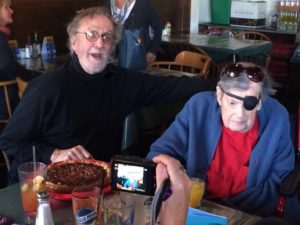George Miller: ‘Gamos’ and Other Tales from Sam’s Grill
by Martin Meeker, Charles B. Faulhaber Director of the Oral History Center
The title of this particular oral history reveals not only something about its content, it provides some hint about the circumstances of the interview itself. In this transcript, you’ll see the usual Oral History Center (OHC) template of question followed by answer and so forth, but befitting the setting of the interview — San Francisco’s historic Sam’s Grill — this exchange was more a wide-ranging conversation. It turns out that George Miller, our featured narrator here, doesn’t much like the spotlight. Although he has many accomplishes to boast, he would prefer to talk ideas and give space to those things that he finds important, interesting, confounding, and amusing.

You will learn in this interview that George Miller first came to know the Oral History Center in the course of serving as a volunteer archivist, processing collections in our home, The Bancroft Library. Surrounding himself with many other very interesting and accomplished individuals, Miller asked the then OHC director if we might like to do an oral history with Thomas Graff, a man who was deeply active in environmental politics and a leader of the Environmental Defense Fund. It was agreed that Graff was a very worthy subject and Miller generously sponsored the interview. Over the following decade, Miller nominated — and underwrote — many more oral histories, thus helping OHC maintain its operations while also contributing to expansion of the oral history collection at Berkeley. As of 2019, the list includes: Jake Warner, Rick Laubscher, Will Travis, Joe Bodovitz, Anne Halsted, Michael Teitz, Jim Chappell, John Briscoe (in 2020), and, last but not least, a forty-hour interview with Warren Hinckle. As the interviewer for the Bodovitz and Travis interviews, I first met Miller around 2014. I recall an informal tipple at the Faculty Club cocktail lounge when I think I finally pieced it together: 1. He was not George Miller, the congressman; 2. Despite his rather informal façade, he is a very serious thinker; and 3. That plaque above a urinal in the men’s restroom at the club? It honored none other than George Miller, our partner in these interviews.
After engaging with Miller over the years, I suggested that he should sit for an oral history interview himself. This suggestion, and the many that followed, were rebuffed with silence. As time went on, however, I began better to grasp the necessity of conducting his oral history, despite the refusal of the potential narrator, Miller himself. So, I pressured a bit more and enlisted the support of a few allies. He finally agreed to entertain the idea, and after a few lunches at Sam’s to hash over the idea, he ultimately consented. He reasoned, to paraphrase, it might be better to do something and regret it, than not do it at all. Still, Miller made it clear that he didn’t want a conventional interview that would run point-by-point through his life. He also wanted to do these sessions at Sam’s. Neither scope nor setting would be conventional, but that was fine with me. As you read the interview, you might see that my typical interviewing structure tended to impose itself on the proceedings, but the setting and, certainly, the narrator shook things up a bit. What you have here, then, in just a bit over five hours, is an opinionated, informed, humane, rollicking, and oftentimes deeply humorous running commentary on a wide-ranging set of specific events and big themes. We get a glimpse into the history of investing and the psychology of the market; we learn of Miller’s commitment to the environment and his iconoclastic effort to restore Yosemite’s Hetch Hetchy Valley (by tearing down a massive dam); we gain insight into Bay Area urbanism and the challenges faced by those trying to improve it; and we are treated to a unique philanthropic vision for the University of California, Berkeley, and beyond. But even more than these topics, this interview invites you to pull up a stool at the bar and hear the musings and be regaled with well told stories by someone who really has seen it all.